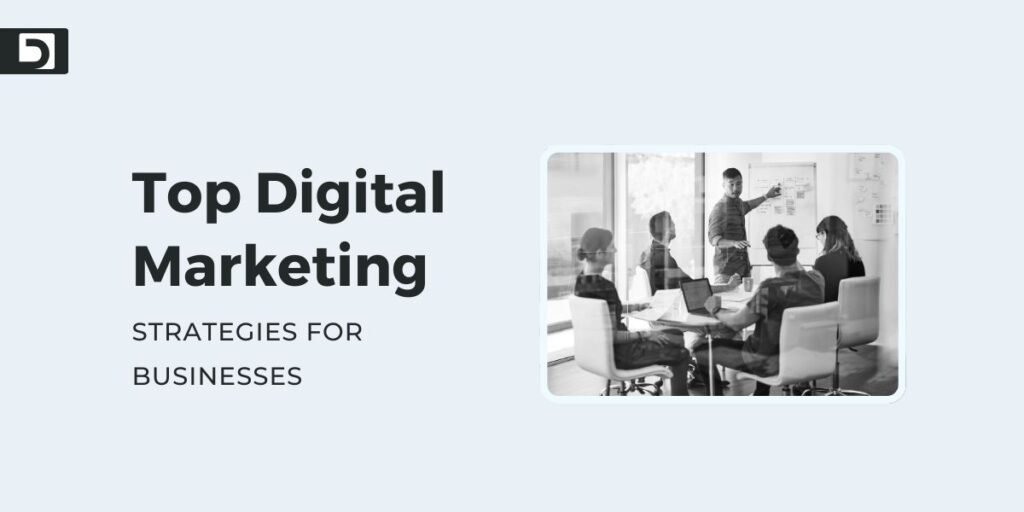If you are a business owner promoting your business online with the right planning, approach, and strategies, it is called a digital marketing strategy.
Every business should have a well-defined digital marketing strategy to achieve marketing goals and generate revenue.
Digital marketing planning evolves over time as marketing goals change and new opportunities arise.
In this comprehensive blog, we’ll dive into everything you need to know about creating an effective digital marketing strategy that can drive growth for your brand.
What is a Digital Marketing Strategy?
A digital marketing strategy is a detailed plan that outlines how a business will use digital channels to achieve its marketing goals and grow online.
It involves using online platforms and tools to reach potential customers, engage with them, and convert them into loyal customers.
A well-defined digital marketing strategy ensures your online marketing efforts are effective and drive better results and maximize return on investment.
Here Are Some Recent Insights Into Digital Marketing Strategies:
- Global Digital Advertising Growth – Worldwide spending on digital marketing is projected to surpass $442 billion in 2024 and is expected to approach half a trillion dollars by 2026.
- Mobile Advertising Dominance – Mobile advertising is anticipated to account for 86% of ad spending in 2024, reflecting the increasing shift towards mobile device usage.
- B2B Digital Advertising Surge – In the U.S., B2B digital advertising spending is expected to reach an estimated $18.5 billion by 2024, indicating significant growth in the sector.
- Display and Search Advertising Expenditures – By the end of 2024, spending on display advertising is projected to hit $352.3 billion, while search advertising is expected to reach $190.5 billion.
- Digital Marketing Industry Expansion – The global digital marketing industry is forecasted to grow at a compound annual growth rate (CAGR) of 13.9%, with the market size projected to reach $786.2 billion by 2026.
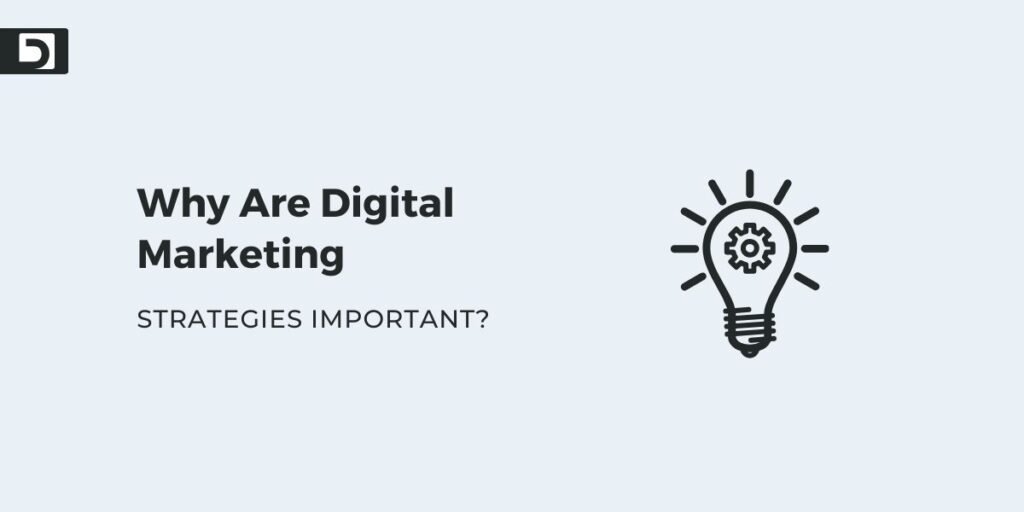
Why Are Digital Marketing Strategies Important?
Digital marketing strategies are essential for businesses to build a strong online presence, connect with their audience, and achieve their goals.
A clear strategy ensures all marketing efforts are focused, preventing wasted resources and guiding businesses in the right direction. By defining goals, target audiences, and channels, companies can align their activities and work more efficiently.
A well-planned strategy helps businesses use their resources wisely, focusing on channels that provide the best return on investment.
It also improves targeting by understanding audience behavior, allowing for personalized campaigns that drive higher engagement and conversions. Additionally, digital marketing offers real-time performance tracking, enabling businesses to measure results, optimize campaigns, and continuously improve.
Having a solid digital marketing strategy gives businesses a competitive edge, enhances customer engagement, and helps build brand trust and awareness.
By adapting to market changes and refining their approach, businesses can achieve long-term growth and sustained success.
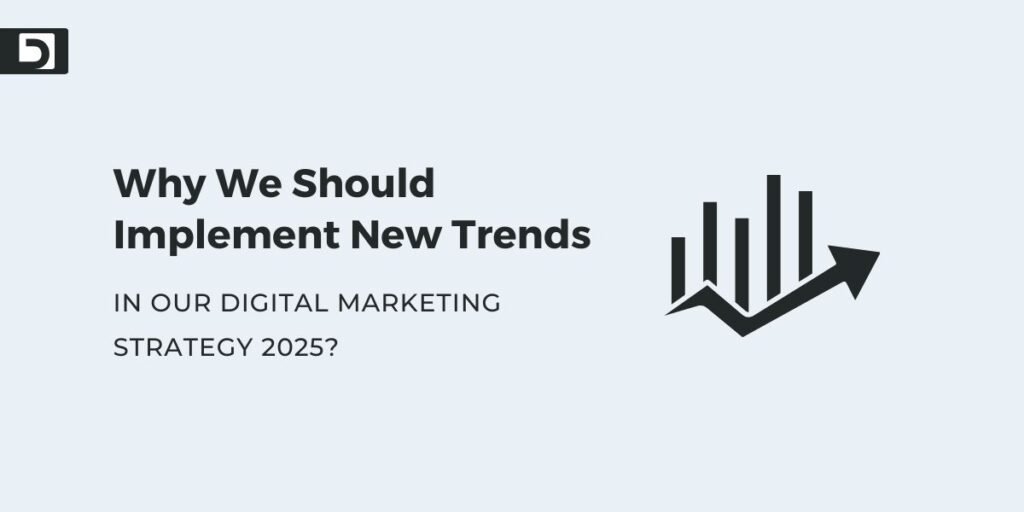
Why We Should Implement New Trends In Our Digital Marketing Strategy 2025?
Implementing new trends in digital marketing keeps your business competitive and relevant. As consumer behavior changes and technology advances, staying updated allows you to connect with audiences in fresh, engaging ways.
New trends help you reach potential customers where they spend most of their time online.
By adopting the latest tools and platforms, businesses can improve targeting, personalize campaigns, and boost engagement.
Emerging trends like AI, video content, and voice search optimization can enhance user experience and drive better results. This ensures higher returns on your marketing investment.
Keeping up with trends also positions your brand as innovative and forward-thinking. It helps build trust, attract new customers, and retain existing ones by showing that your business evolves with market demands. Embracing change is key to sustaining long-term growth and success.
What Are The Emerging Digital Marketing Trends In 2025?
In 2025, digital marketing will continue to evolve with cutting-edge technologies and new consumer behaviors.
As businesses strive to stay competitive and relevant, they will need to adapt to emerging trends that focus on personalization, user experience, and innovative tools.
Here we have covered 10 must-know Digital Marketing Trends for 2025
1. AI-Driven Marketing Automation
Learn how AI is revolutionizing content creation, ad targeting, and customer interactions.
2. Hyper-Personalized Marketing
See how real-time personalization improves user experience and drives higher conversion rates.
3. The Rise of Short-Form Video Content
Discover why TikTok, Instagram Reels, and YouTube Shorts continue to dominate digital marketing.
4. Voice Search Optimization
Prepare your business for the growing number of voice-based searches and smart assistants.
5. The New Era of Influencer Marketing
Understand why micro and nano-influencers are becoming essential for authentic brand promotion.
6. Data Privacy and First-Party Data Strategies
Learn how to build trust through ethical data collection and transparency.
7. SEO in 2025 – User Experience Over Keywords
Explore how search engines prioritize user experience, mobile-first design, and AI-optimized content.
8. Augmented Reality (AR) and Virtual Reality (VR) Integration
See how immersive AR/VR experiences enhance product marketing and customer engagement.
9. Social Commerce – The Future of Online Shopping
Find out how platforms like Instagram and TikTok are turning social media into powerful eCommerce channels.
10. Metaverse and Web 3.0 Marketing
Learn how brands are preparing for decentralized platforms and immersive digital environments.
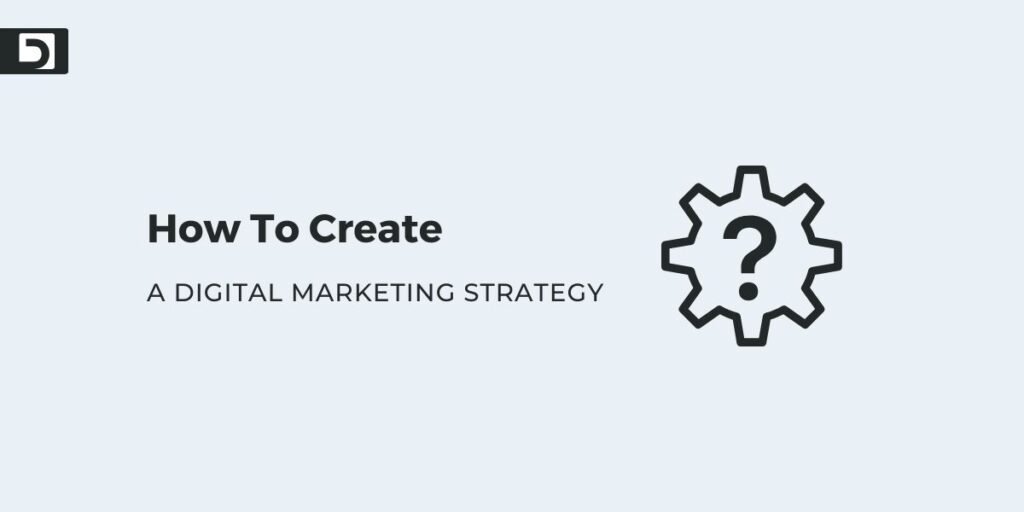
How To Create A Digital Marketing Strategy
1. Set Clear Goals
Define clear objectives for your digital marketing efforts. These goals should be Specific, Measurable, Achievable, Relevant, and Time-bound (SMART).
For instance, you might aim to increase website traffic by 20%, generate 50 new leads per month, or boost social media engagement by 15%.
Ensure that these digital marketing goals are aligned with your overall business objectives to maintain a cohesive strategy.
2. Know Your Audience
Understanding your audience is crucial for crafting effective marketing messages. Conduct thorough market research through surveys, interviews, and data analysis to gain insights into your audience’s needs, preferences, and behaviors.
Create detailed buyer personas that represent your ideal customers. These personas will guide your marketing efforts and help you tailor your messaging to resonate with your target audience.
3. Choose the Right Channels
Selecting the most effective digital channels is key to reaching your target audience. Focus on channels where your audience spends the most time and where you can achieve the best results.
Common channels include Search Engine Optimization (SEO) for improving visibility on search engines, Pay-Per-Click (PPC) Advertising for driving targeted traffic, Content Marketing for engaging and educating your audience, Social Media Marketing for building brand awareness, and Email Marketing for nurturing leads and maintaining customer relationships.
4. Develop a Content Plan
Content is at the heart of digital marketing. Develop a comprehensive content plan that outlines the types of content you will create, the topics you will cover, and the platforms where you will publish.
Ensure your content aligns with your marketing goals and addresses the different stages of the buyer’s journey—awareness, consideration, and decision. Types of content can include blog posts, videos, infographics, eBooks, whitepapers, and social media updates.
5. Allocate Budget Wisely
Determining your budget allocation is essential for maximizing ROI. Assess the costs associated with each digital channel and prioritize those that offer the highest return on investment.
Ensure you have allocated enough budget for tools, resources, and personnel required to execute your strategy effectively.
Regularly review your budget allocation to ensure it remains aligned with your goals and market conditions.
6. Utilize Analytics
Using analytics tools to track and measure the performance of your digital marketing efforts is crucial. Key performance indicators (KPIs) may include website traffic, conversion rates, click-through rates (CTR), customer acquisition cost (CAC), and return on ad spend (ROAS).
Regularly analyze this data to gain insights into what is working and what needs improvement. Use these insights to make informed decisions and optimize your strategy for better results.
7. Stay Updated with Trends
The digital marketing landscape is constantly evolving. Stay updated with the latest trends, technologies, and best practices to remain competitive.
Subscribe to industry blogs, attend webinars, and participate in online communities to keep your knowledge current.
Being aware of new tools and techniques can help you adapt your strategy to changing market conditions and consumer behaviors.
8. Test and Optimize Continuously
Continuous testing and optimization are essential for refining your digital marketing strategy. Implement A/B testing to determine what works best for your audience.
Experiment with different elements of your campaigns, such as headlines, images, and call-to-actions, to identify the most effective combinations.
Use the results of these tests to make data-driven adjustments and improve your strategy over time.
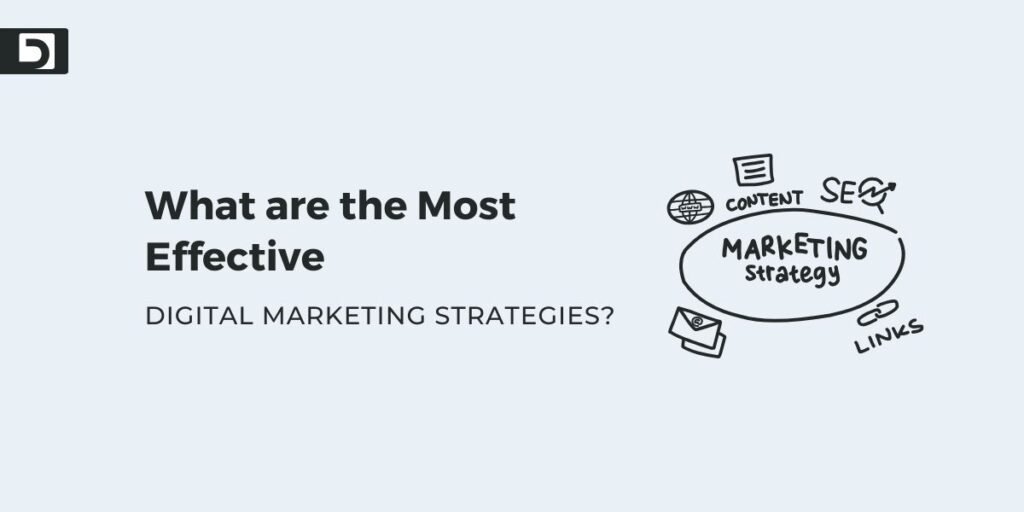
What are the Most Effective Digital Marketing Strategies?
Digital marketing encompasses a variety of strategies that can be tailored to fit the needs of any business. Here are some of the most effective digital marketing strategies:
1. Search Engine Optimization (SEO)
SEO involves optimizing your website to rank higher in search engine results pages (SERPs). This increases organic traffic to your site.
Key components of SEO include keyword research, on-page optimization, technical SEO, and building high-quality backlinks. Regularly updating your content and ensuring your site is mobile-friendly are also crucial for maintaining good SEO performance.
2. Pay-Per-Click Advertising (PPC)
PPC advertising allows you to place ads on search engines and other platforms, paying only when someone clicks on your ad.
Google Ads and social media platforms like Facebook and Instagram offer robust PPC advertising options.
PPC campaigns can be highly targeted, allowing you to reach specific demographics, locations, and even users with particular interests or behaviors.
3. Content Marketing
Content marketing focuses on creating and distributing valuable, relevant, and consistent content to attract and engage a target audience.
Types of content include blog posts, articles, videos, infographics, eBooks, whitepapers, and podcasts.
The goal is to provide useful information that helps solve problems for your audience, positioning your brand as a trusted authority in your industry.
4. Social Media Marketing
Social media marketing involves using platforms like Facebook, Instagram, Twitter, LinkedIn, and others to promote your brand and engage with your audience.
This strategy includes creating and sharing content, running ads, and interacting with followers.
Social media marketing helps build brand awareness, foster community engagement, and drive traffic to your website.
5. Email Marketing
Email marketing is a powerful tool for nurturing leads and maintaining relationships with customers.
It involves sending targeted emails to your subscribers, which can include newsletters, promotional offers, product updates, and personalized recommendations.
Effective email marketing relies on building a quality email list and segmenting it to send relevant content to different audience groups.
6. Influencer Marketing
Influencer marketing leverages individuals with a large following on social media or other platforms to promote your products or services.
Influencers can help you reach a broader audience and build credibility through their trusted recommendations.
Partnering with the right influencers who align with your brand values is crucial for successful influencer marketing.
7. Affiliate Marketing
Affiliate marketing involves partnering with other businesses or individuals (affiliates) who promote your products or services in exchange for a commission on sales.
Affiliates use various marketing tactics, such as blogging, social media promotion, and email marketing, to drive traffic to your site.
This strategy can significantly expand your reach and generate sales without a large upfront investment.
8. Online Public Relations (PR)
Online PR focuses on managing your brand’s reputation and gaining media coverage through digital channels.
This includes sending press releases to online publications, engaging with journalists and bloggers, and managing your presence on review sites.
Positive media coverage and customer reviews can enhance your brand’s credibility and visibility.
9. Webinars and Live Events
Hosting webinars and live events can effectively engage with your audience, educate them about your products or services, and generate leads.
Webinars allow you to demonstrate your expertise and interact with potential customers in real-time.
Promoting these events through email marketing, social media, and your website can help attract a larger audience.
10. Video Marketing
Video marketing involves creating and sharing videos to promote your brand, products, or services.
Platforms like YouTube, Vimeo, and social media sites are excellent for distributing video content. Videos can include product demos, customer testimonials, how-to guides, and behind-the-scenes looks at your business.
Engaging videos can capture attention, explain complex concepts, and drive higher engagement rates.
Conclusion
In conclusion, crafting a well-defined digital marketing strategy is essential for businesses aiming to thrive in the ever-evolving digital landscape.
By understanding the key components of a strategy, such as setting clear goals, identifying your audience, choosing the right channels, and leveraging the latest digital marketing trends, businesses can effectively drive growth and stay ahead of the competition.
As we look ahead to 2025, staying informed and adapting to emerging trends like AI, voice search optimization, and social commerce will be crucial to engaging with customers in innovative and impactful ways.
Implementing these strategies will help businesses connect with their target audience, enhance brand awareness, and increase their return on investment.
At Digital Braino, we specialize in creating tailored digital marketing strategies that drive results. As a leading digital marketing agency in Indore, we are committed to helping businesses harness the power of the latest marketing trends and technologies to achieve their goals.
Whether you’re looking for SEO, social media marketing, PPC, content marketing, or other digital marketing services, Digital Braino is here to help your business grow and succeed in the digital world.
Let us help you navigate the complexities of digital marketing and build a strategy that delivers real, measurable success.
